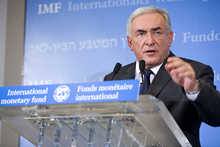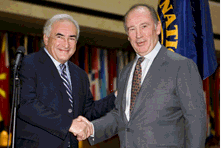
Typical street scene in Santa Ana, El Salvador. (Photo: iStock)
IMF Survey: Strauss-Kahn Takes Over as New IMF Head
November 1, 2007
- Becomes IMF's tenth Managing Director
- Says further reform of institution required
- Acknowledges need to tackle issues of IMF's relevance, legitimacy
Former French Finance Minister Dominique Strauss-Kahn began his job as the new IMF Managing Director on November 1 determined to put fresh vigor into reform of the 185-member institution that oversees the global economy.

Strauss-Kahn: making globalization "better for everybody" is important to help maintain international stability, security (IMF photo)
NEW MANAGING DIRECTOR
He was welcomed with a handshake at the front door of the IMF by outgoing Managing Director Rodrigo de Rato, who had announced his resignation last June.
Strauss-Kahn says that he will press ahead with reforms initiated by de Rato, particularly changes to give a stronger voice within the institution to major emerging market and low-income countries.
He takes over amid worries about the impact on the global economy of fallout from the meltdown of the subprime mortgage market in the United States and continued concern about the possibility of the rapid unwinding of global imbalances and the effect on major currencies.
The latest IMF-World Bank Annual Meetings, held last month, coincided with a watershed in global economic growth. Three major emerging markets—China, India, and Russia—now account for more than half of world growth, according to the just released IMF World Economic Outlook. This development puts into sharp focus the intended reform to give emerging markets a bigger say at the IMF, where representation, as with many international institutions, still largely reflects a post-World War II balance of power.
Managing Director for reform
Strauss-Kahn, who has declared his intention to be a reforming managing director, underscores that the IMF faces questions about its own relevance and legitimacy. In an interview, he said that some countries were questioning the usefulness of the Fund, given that they have enough foreign exchange reserves not to have to be dependent on the IMF.

Strauss-Kahn (l) welcomed to IMF headquarters by de Rato on new Managing Director's arrival for first day of work as IMF head (IMF photo)
As for legitimacy, he stressed that "the institution has to be owned by its 185 member countries, but "as everybody knows, some countries and some parts of the world feel themselves not well enough represented."
A process to give emerging market countries and developing nations a louder voice in the running of the Fund is already under way as part of an overall reform strategy approved in 2005 to modernize the work of the multilateral institution. After an initial round of ad hoc increases announced at the Annual Meetings in Singapore in 2006 to enhance the voice of four dynamic economies that were clearly underrepresented (China, Korea, Mexico, and Turkey), the IMF has now embarked on the second and more far-reaching phase of the reform process, with completion envisaged by fall 2008.
But Strauss-Kahn said legitimacy went beyond the issue of representation, known as quota and voice. "It's a question of diversity of staff, and of how much emerging market and low-income countries are taken into account when important decisions are made."
IMF as stabilizer
Strauss-Kahn, a former member of the French National Assembly and Professor of Economics at the Institut d'Etudes Politiques de Paris, said the IMF needed to be involved in helping to ensure that globalization worked in the interests of people around the world.
"I won't say that globalization is good for everybody because there's always people who will suffer from inequality and poverty," he said. "But at least we can try to make globalization better for everybody."
This would be important in helping to maintain international stability and security, he stated.
Income and expenditure
Strauss-Kahn said that he would make solving the IMF's income and expenditure problems a priority. The IMF has traditionally paid for its operations from interest earned on its lending. But, as financial crises diminished in the first half of the decade and borrowers repaid the Fund the large loans they had earlier taken out, the IMF began to look for a new income model that would make it less dependent on revenue from lending to run the institution of 2,700 employees based in Washington, D.C.
The IMF Executive Board is now considering an alternative income model for the Fund. But Strauss-Kahn said that examining expenditure would also be important.
He was determined, he said, to restore a strong role for the IMF. "That's why I'm really excited to work with you in the coming days and the coming weeks to give the Fund the role it deserves in globalization," he added.


